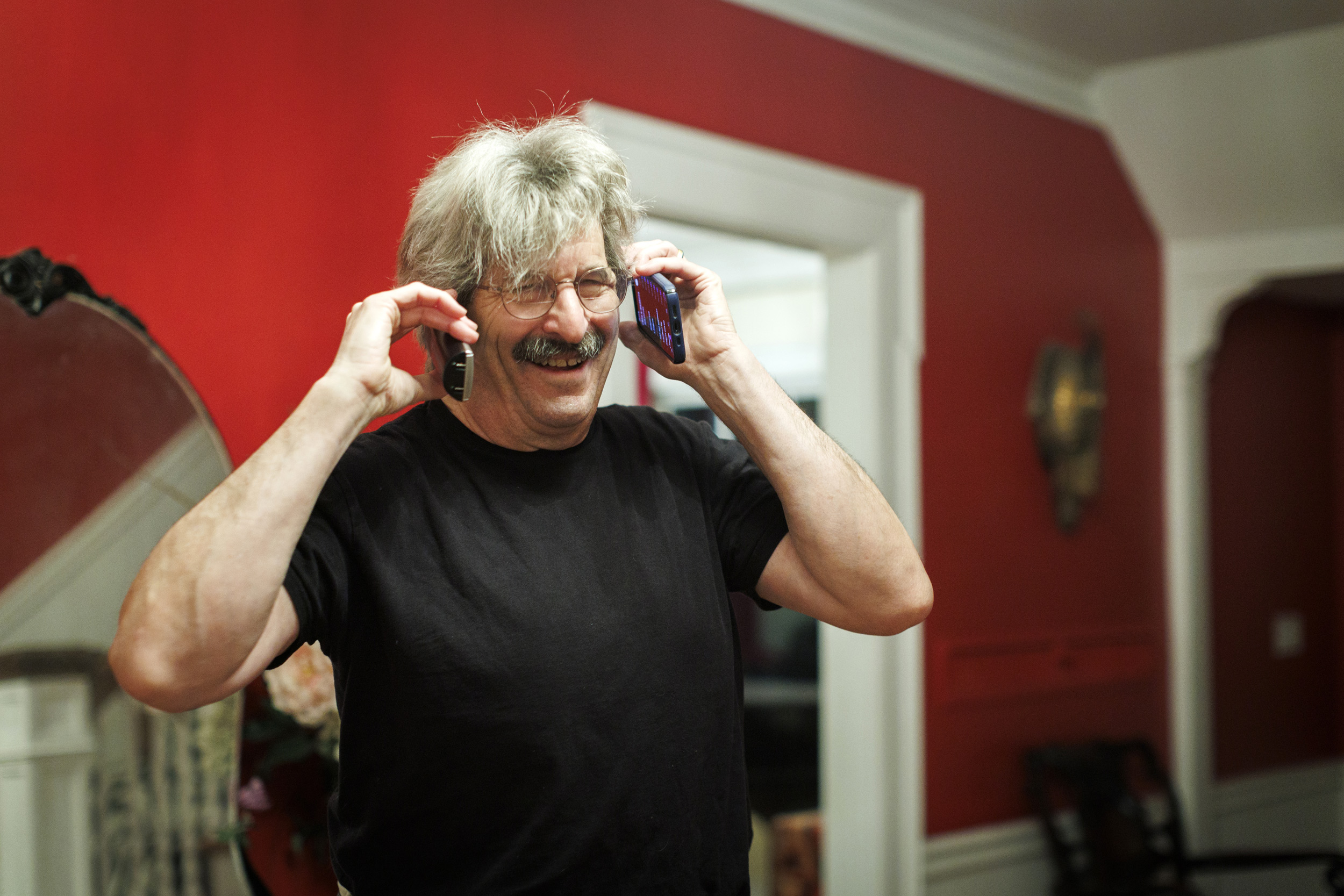What’s next after a Nobel? It’s a surprise.

Professor Gary Ruvkun answers multiple phone calls following the announcement.
Stephanie Mitchell/Harvard Staff Photographer
Harvard scientist Gary Ruvkun awarded medicine prize for microRNA insights. ‘My ignorance is bliss,’ he says.
Gary Ruvkun, a professor of genetics at Harvard Medical School and a Mass General researcher, was the center of attention Monday among Harvard and hospital colleagues after receiving the 2024 Nobel Prize in physiology or medicine for his role in the discovery of microRNA.
Ruvkun, who shared the prize with his longtime collaborator Victor Ambros, formerly of Harvard and today a professor at the University of Massachusetts Medical School, waved to fellow researchers and cracked a few jokes during a news conference at Mass General, not too far away from his lab at the Richard B. Simches Research Center.
“It’s been a good morning,” he said.
Ruvkun was born in Berkeley, California, in 1952, and earned his bachelor’s degree from the University of California at Berkeley in 1973. He received his Ph.D. from Harvard in 1982, and became a principal investigator at Mass General and at the Medical School in 1985. Ruvkun and Ambros were Harvard colleagues when they began to collaborate on studies of the role played by two genes, lin-4 and lin-14, in regulating abnormal development in the roundworm C. elegans.
In work conducted at Harvard and published in 1993, Ambros cloned C. elegans’ lin-4 gene and found that it did not code for a protein, as most other genes did. Instead, it encoded a very small strand of RNA, just 22 bases long. Next, Ruvkun discovered a tiny RNA string with the ability to bind to lin-14’s messenger RNA, large molecules that carry genetic information from the gene to the cell’s ribosome, where the information gets translated into protein. By disrupting this process, the microRNA disrupted the gene’s expression and affected development.
Seven years later, Ruvkun’s lab found a second microRNA, called let-7, that also blocks the expression of its target gene, again altering development. But it was his subsequent discovery of let-7 in a range of living things, from worms to fish to humans, that illustrated that its role is fundamental enough that it has been conserved over millions of years of evolution. That finding sparked an explosion of interest in the role of microRNA in regulating development. Today, more than 1,000 human genes for microRNA have been discovered. These genes play roles in normal and abnormal development and in heart disease, cancer, neurodegenerative disorders, and other conditions.
Ruvkun received the call informing him of the prize at 5:30 a.m. Monday
“The phone rang and we don’t get middle-of-the-night phone calls,” he said. “We answered it and it was the secretary of the Nobel committee and it sounded real. We’ve received awards for this and it’s always been wonderful. It’s a big deal.”
During the news conference, Ruvkun thanked Mass General for supporting his work and that of other microbiologists. Even after 40 years, there’s no end in sight to his research, he said. C. elegans has some 20,000 genes. There are thousands he knows nothing about.
“The surprises are what keep you young in science and I’m constantly surprised,” Ruvkun said. “My ignorance is bliss.”
Harvard President Alan M. Garber extended his congratulations to the new Nobel laureates, praising their pioneering research.
“Nobody who knows Gary or his work could be surprised by this recognition for his research on microRNA,” he said. “A brilliant investigator, his curiosity has led him to one remarkable insight into fundamental biology after another. The implications of discoveries like Gary’s and Victor’s aren’t always obvious at the outset. With promising medical applications of microRNA research on the horizon, we are reminded — again — that basic research can lead to dramatic progress in addressing human diseases.”
Speakers at the news conference celebrated Ruvkun’s achievement and, like Garber, noted that his work demonstrates the power of basic science.
“We celebrate with the entire world your incredible achievements — we celebrate the power of science, the power of brilliant minds,” said David Brown, president of academic medical centers for Mass General Brigham and the Mass General Trustees Professor of Emergency Medicine at HMS. “I’m thrilled to welcome you as Nobel laureate Dr. Gary Ruvkun — and that has a nice ring to it. Dr. Ruvkun and his colleagues have pushed the boundaries of science on our understanding of life on this planet.”
Dean George Q. Daley of the Medical School echoed Brown’s praise.
“The revelation of microRNA regulation is absolutely a shining example of how curiosity driven research can be turned into actionable knowledge that will advance human health for the betterment of humanity,” he said.




